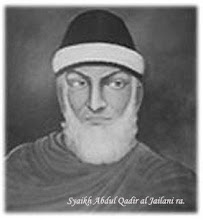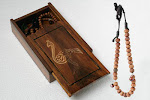Story 9
One of the devotees of Mount Lebanon, whose piety was famed in the Arab country and his miracles well known, entered the cathedral mosque of Damascus and was performing his purificatory ablution on the edge of a tank when his feet slipped and he fell into the reservoir but saved himself with great trouble. After the congregation had finished their prayers, one of his companions said: ‘I have a difficulty.’ He asked: ‘What is it?’ He continued: ‘I remember that the sheikh walked on the surface of the African sea without his feet getting wetted and today he nearly perished in this paltry water which is not deeper than a man’s stature.
What reason is there in this?’ The sheikh drooped his head into the bosom of meditation and said after a long pause: ‘Hast thou not heard that the prince of the world, Muhammad the chosen, upon whom be the benediction of God and peace, has said: I have time with God during which no cherubim nor inspired prophet is equal to me?’ But he did not say that such was always the case. The time alluded to was when Gabriel or Michael inspired him whilst on other occasions he was satisfied with the society of Hafsah and Zainab. The visions of the righteous one are between brilliancy and obscurity.
Thou showest thy countenance and then hidest it Enhancing thy value and augmenting our desire. I behold whom I love without an intervention. Then a trance befalls me; I lose the road; It kindles fire, then quenches it with a sprinkling shower. Wherefore thou seest me burning and drowning.
Story 10
One asked the man who had lost his son: ‘O noble and intelligent old man!
As thou hast smelt the odour of his garment from Egypt
Why hast thou not seen him in the well of Canaan?’
He replied: ‘My state is that of leaping lightning. One moment it appears and at another vanishes. I am sometimes sitting in high heaven. Sometimes I cannot see the back of my foot. Were a dervish always to remain in that state He would not care for the two worlds.’
One asked the man who had lost his son: ‘O noble and intelligent old man!
As thou hast smelt the odour of his garment from Egypt
Why hast thou not seen him in the well of Canaan?’
He replied: ‘My state is that of leaping lightning. One moment it appears and at another vanishes. I am sometimes sitting in high heaven. Sometimes I cannot see the back of my foot. Were a dervish always to remain in that state He would not care for the two worlds.’
Story 11
I spoke in the cathedral mosque of Damascus a few words by way of a sermon but to a congregation whose hearts were withered and dead, not having travelled from the road of the world of form, the physical, to the world of meaning, the moral world. I perceived that my words took no effect and that burning fire does not kindle moist wood. I was sorry for instructing brutes and holding forth a mirror in a locality of blind people. I had, however, opened the door of
meaning and was giving a long explanation of the verse We are nearer unto Him than the jugular vein till I said:
‘The Friend is nearer to me than my self, But it is more strange that I am far from him.
What am I to do? To whom can it be said that he Is in my arms, but I am exiled from him.’
I had intoxicated myself with the wine of these sentiments, holding the remnant of the cup of the sermon in my hand when a traveller happened to pass near the edge of the assembly, and the last turn of the circulating cup made such an impression upon him that he shouted and the others joined him who began to roar, whilst the raw portion of the congregation became turbulent.
I spoke in the cathedral mosque of Damascus a few words by way of a sermon but to a congregation whose hearts were withered and dead, not having travelled from the road of the world of form, the physical, to the world of meaning, the moral world. I perceived that my words took no effect and that burning fire does not kindle moist wood. I was sorry for instructing brutes and holding forth a mirror in a locality of blind people. I had, however, opened the door of
meaning and was giving a long explanation of the verse We are nearer unto Him than the jugular vein till I said:
‘The Friend is nearer to me than my self, But it is more strange that I am far from him.
What am I to do? To whom can it be said that he Is in my arms, but I am exiled from him.’
I had intoxicated myself with the wine of these sentiments, holding the remnant of the cup of the sermon in my hand when a traveller happened to pass near the edge of the assembly, and the last turn of the circulating cup made such an impression upon him that he shouted and the others joined him who began to roar, whilst the raw portion of the congregation became turbulent.
Whereon I said: ‘Praise be to God! Those who are far away but intelligent are in the presence of God, and those who are near but blind are distant.’
When the hearer understands not the meaning of words Do not look for the effect of the orator’s force But raise an extensive field of desire That the eloquent man may strike the ball of effect.
Story 12
One night I had in the desert of Mekkah become so weak from want of sleep that I was unable to walk and, laying myself down, told the camel driver to let me alone. How far can the foot of a wretched pedestrian go When a dromedary gets distressed by its load? Whilst the body of a fat man becomes lean A weak man will be dead of exhaustion.
He replied: ‘O brother, the sanctuary is in front of us and brigands in the rear. If thou goest thou wilt prosper. If thou sleepest thou wilt die.’ It is pleasant to sleep under an acacia on the desert
road But alas! thou must bid farewell to life on the night of departure.
(From "Gullistan" - The Book Of Shaykh Sa'di as Shirazi)









